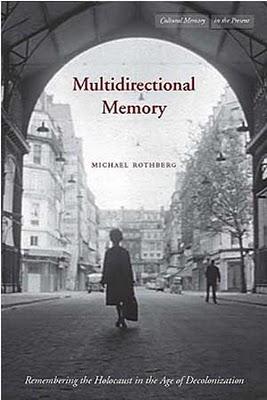Multidirectional Memory: Remembering the Holocaust in the Age of Decolonization

In Multidirectional Memory, Michael Rothberg offers an alternative to competitive memory, or the idea that the capacity to remember historical injustices is limited and that any attention to one injustice diminishes our capacity to memorialize another. Rothberg also disputes the idea that comparisons between atrocities erase differences between them and imply a false equivalence. In focusing on the Holocaust, Rothberg navigates between two extremes: the tendency to proclaim the Holocaust so distinct that it should not be compared to anything else, and the tendency to universalize the Holocaust, turning it into an abstract lesson about good and evil that can be applied to any and all atrocities. His solution is “multidirectional memory,” which describes collective memory as “subject to ongoing negotiation, cross-referencing and borrowing; as productive and not privative.” In other words, comparisons can both aid in understanding and illuminate differences.
In part one, Rothberg explores the idea of “boomerang effects” found in Hannah Arendt’s The Origins of Totalitarianism and Aimé Césaire’s works on colonialism and genocide. Through these works and many others, Rothberg examines how, prior to a full accounting for the Holocaust and its reinvention as a historically unique event, scholars such as Arendt and Césaire were constructing the Holocaust and totalitarianism as colonial practices, ideas and structures brought to Europe from the colonies. While Rothberg does a serviceable job of explaining and justifying the productive nature of the comparisons in the abstract, he glosses over the unfortunate concrete relationship between colonial genocides and the Holocaust, specifically Hitler‘s modeling of concentration camps after the North American reservation system and his co-opting of the language and tactics of the so-called Wild West. He mentions these links briefly, but so vaguely as to conceal them from any reader not familiar with the historical facts.
In part two, Rothberg focuses on the works of W. E. B. Du Bois, André Schwarz-Bart, and Caryl Phillips as they explore the light the Holocaust and anti-Semitism shed on the Black experience in the United States, Europe, and the Caribbean. Here, the comparisons are limited to the abstract connections between the historical oppression of people of African descent (including slavery, colonialism, segregation, and genocide) and the Nazis’ racialization, ghettoization, and extermination of the Jews. This section also emphasizes both peoples’ histories with “ghettos, ruins, and other diasporic spaces.” This is perhaps the best example of multidirectional memory in the book.
In parts III and IV, Rothberg explores various works (both literary and cinematic) to examine the connections between the Holocaust and the Algerian War in the waning days of French colonialism and the opening days of the Eichmann trial that would transform the public discourse surrounding the Holocaust. Here, Rothberg does a better job of distinguishing the abstract connections between colonialism, racism, and the Holocaust from the concrete connections between French treatment of the Algerians and French complicity in the Holocaust. Perhaps most disturbing is the implication that a timely attempt to address French complicity in the Holocaust may have prevented many if not all of the atrocities committed against the Algerians, as both involved the same people, places, and tactics.
Overall, Rothberg does a decent job of showing how multidirectional memory can improve understanding through comparison; however, the book fails in a few places. By limiting himself to elite discourse, Rothberg underestimates the public’s capacity to undermine or diminish memory of one atrocity through competition with another as part of the self-fulfilling nature of competitive memory. He also doesn’t seem to fully explore how the taboo against comparisons in general and certain comparisons specifically undermines attempts to make such comparisons productive. Finally, his language is often so stereotypically academic that it may be inaccessible to non-experts. In the end, I am left uncertain whether to recommend the book or suggest that readers attempt to find some other work that addresses these concepts more clearly and completely.